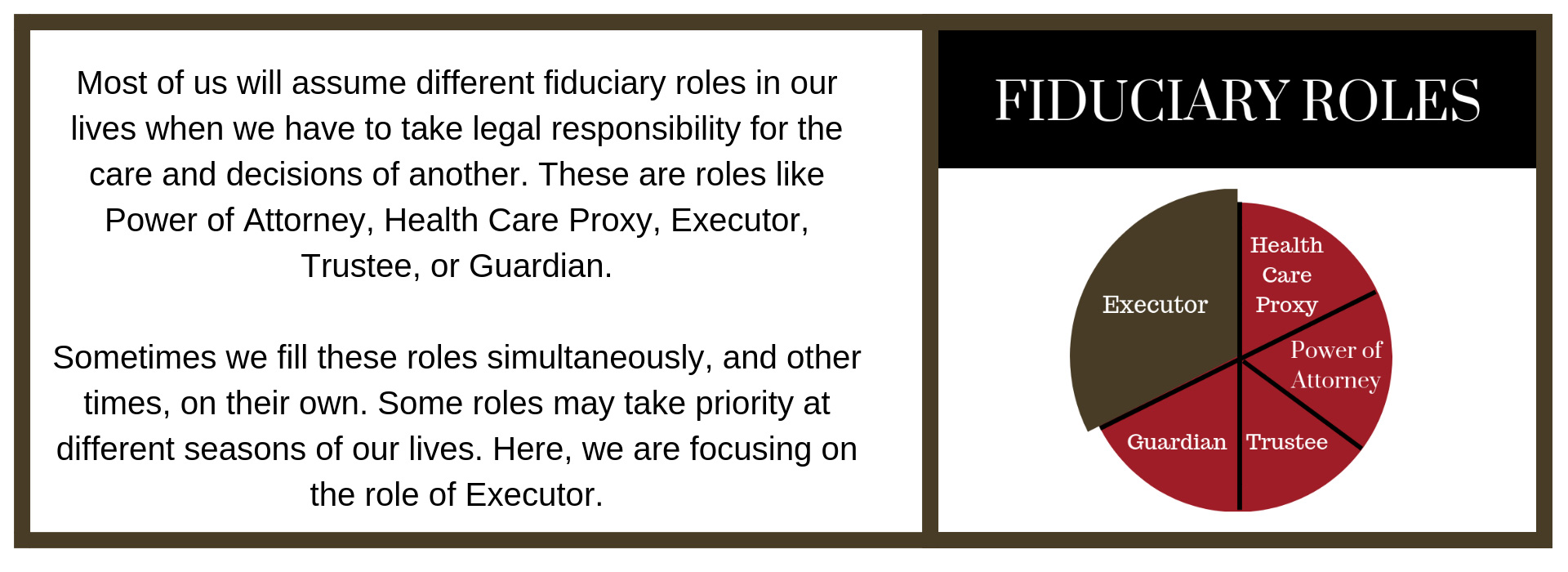You’re an Executor. Now What?

Taking on the role of an executor can be an overwhelming endeavor. It might have sounded like an honor when learning you had been named for this position. Now that the time has come, you have lots of questions. And you need answers.
How do you actually become the executor?
Unlike with a trust, simply having your name listed in a will as the executor does not give you the authority to act. A will must first be filed with the probateProbate can refer to the process of settling the estate of a deceased person. Read More court along with a petition requesting that you, as the nominated executor, be officially appointed by the court. This begins the process of probateProbate can refer to the process of settling the estate of a deceased person. Read More.
The court must review the will to ensure that it was validly executed and notice must also be provided to all heirs and beneficiaries named in the will to provide them the opportunity to object. After about 45 days, and assuming no objections were filed, Letters of Authority (official court documents) are issued to you by the court. It is with these letters that you begin your work as an executor.
Is the executor responsible for all of the decedent’s assets?
An executor is a fiduciary with a duty of responsibility and loyalty to the beneficiaries named in the will. You are not responsible to other beneficiaries such as the beneficiary of a life insurance policy. Executors have a duty to manage only the assets governed by the will.
How do you gain access to a checking account titled only in the decedent’s name at the time they died, without a joint owner or a beneficiary designated? The bank will require that you, as executor, provide them with your probateProbate can refer to the process of settling the estate of a deceased person. Read More Letters of Authority before granting you access to the funds in that account. Then, you are required to protect and manage those funds according to the terms of the will, and for the beneficiaries named therein.
Contrasting this, an insurance company, by law, is required to pay life insurance proceeds to the beneficiary designated on the policy. Assuming the beneficiary is an individual or a trust and not the “estate,” the executor has no right to interfere with the payment of the death benefit made by the insurance company to the beneficiary. Life insurance passing directly to a beneficiary is a common example of an asset passing outside of a will, and therefore outside of the control and direction of an executor of an estate. In such a circumstance the executor has no responsibility to manage or account for those funds.
Is the executor responsible for paying all of the decedent’s debts?
Part of the duties of an executor involve paying known and legitimate outstanding debts. These can include funeral expenses, credit card balances, medical bills, legal fees, and tax liabilities, to name a few. Generally, these types of expenses must be satisfied before any assets are distributed to beneficiaries. On occasion, it may be appropriate to make a partial distribution to the beneficiaries but an executor would never want to distribute all of the estate assets prior to debts being paid, or at least not within one year from the date of death. This is because creditors by law have one year to file claims against an estate in court to collect what they are owed; if an executor disperses all of the funds too early he or she could be held personally liable for the debt. Claims filed by creditors after the one-year mark are not enforceable.
What steps must an executor take to protect estate assets?
An executor can be held liable for failure to adequately protect and preserve assets under their control. For example, a family home that is now unoccupied must be secured by locking all windows and doors, winterizing so that pipes do not freeze, ensuring that utility bills and taxes are paid, and informing the homeowners insurance company that the home is vacant to avoid an interruption in coverage.
Investment accounts should also be protected by working with financial professionals to ensure the account is invested appropriately. If at the time of the decedent’s death, for example, the investments involved risky ventures to achieve high-growth, a change in strategy to a more conservative investment approach may be warranted to prevent losses prior to making final distribution to the beneficiaries. An executor can be held liable for poor investment decision-making.
What types of tax returns must an executor sign?
As executor, you are responsible to see that the decedent’s final individual income tax return gets filed for the year of their death. In addition, the estate will have to report and pay tax on any income generated after the decedent’s death. This gets reported on IRS Form 1041 and, depending on how long it takes to completely administer the estate, more than one tax filing may be necessary.
An estate tax (“death tax”) return is also required if the total value of the decedent’s assets in 2020 were greater than $11.58 million (federal) or $1 million (Massachusetts). Due nine months from the date of death, this type of tax return is completed based on the value of all assets owned on the date of death, but only if the total estate value is greater than the above referenced thresholds. The estate attorney often prepares this return but many CPAs do so as well.
The filing and payment of estate tax due also triggers the release of an automatic lien placed on real estate owned by the decedent. Many executors are unaware that they cannot sell the home without first clearing the tax lien by either paying the tax liability or signing and recording an affidavit stating that no estate tax is owed.
How much information should an executor share with the beneficiaries?
As executor, you are required to provide beneficiaries with an accounting of all of the assets that have come under your control, the income generated by those assets during your watch, the debts and expenses that you paid from those assets, including taxes, and finally the specific amounts distributed to each beneficiary. This accounting should be provided to the beneficiaries and is often filed with the court. Doing so helps to protect you from liability, especially if none of the beneficiaries object. Additionally, beneficiaries can request a copy of the will from the court to review its terms.
The work of an executor is no small task and the time commitment is notable. Some individuals thrive in the role but the majority seem to view the experience as a burden and something they would never like to repeat. This makes having a good legal team behind you all the more important, and in many cases, it can help to delegate most – if not all – of the responsibilities to an independent professional.
Download our free After a Death ebook to learn more about what happens when settling an estate – specifically what happens to assets and debts, the taxes incurred, and all of the roles that need to be filled.





